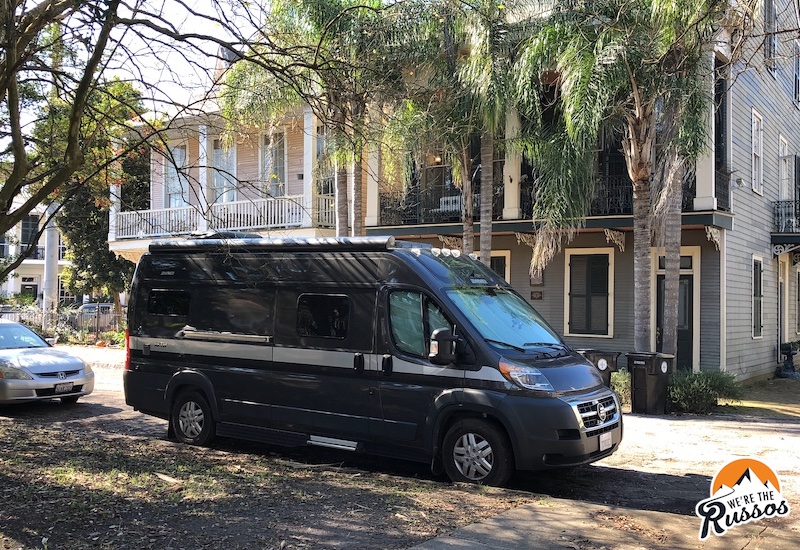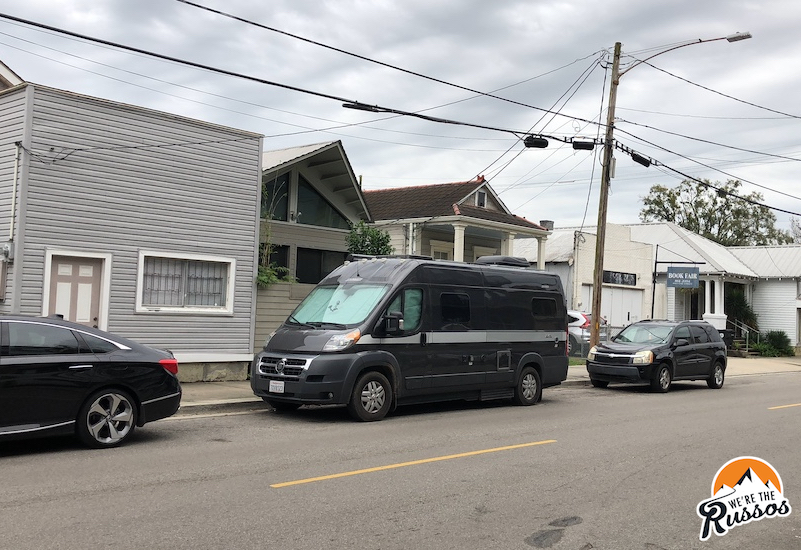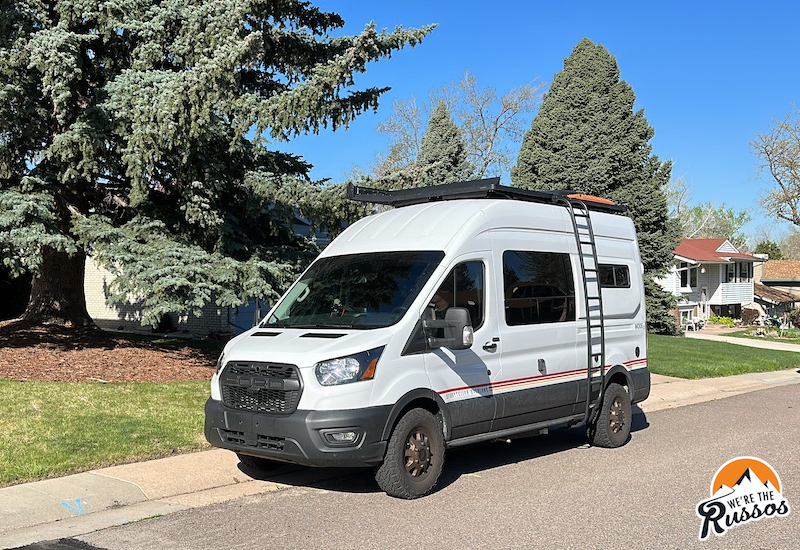This post may contain affiliate links.
What is stealth camping? Stealth camping refers to camping in an urban environment in a discreet manner. These stealth campers are often found on public streets, parking lots, and other accessible spaces. The allure of stealth camping comes from its ability to blend in with everyday environments, allowing for the convenience of camping almost anywhere it is legal to park.

When it comes to camping, one question that comes up frequently is: Do you really need a stealth camper? The short answer is: not necessarily. However, the answer isn’t as simple as that. It depends largely on your specific needs and circumstances.
Stealth Camping
In the video above, I share our experiences with stealth camping along with tips for free camping in urban enviornements. Be sure to check out the comment section of the video for stealth camping experiences from fellow campers.
“The Knock”
A main concern leading people to consider a stealth camper is the fear of “the knock” in the middle of the night. This refers to being asked to move your camper or vehicle, often by law enforcement or security. In eight years of RV travel, with six and a half of those years living full-time on the road, the number these incidents we’ve encountered has been minimal and all related to camping at Walmart. So the fear of the midnight knock might be more intimidating than the reality itself.
Urban Camping

Before we delve into the intricacies of stealth camping, it’s essential to distinguish between the two primary ways it’s practiced. In this post, I will focus on urban stealth camping for scenarios where you’re traveling to a town or city to visit friends and family or see the sights. For these cases, you don’t necessarily need a stealth camper to enjoy urban camping.
However, certain people may find a stealth camper indispensable. This is typically true for those using their camper as a permanent home within a city or for individuals who need to stay under the radar due to specific circumstances or regulations.
Examples that require a stealth camper include employees camping in their workplace’s parking lot or students living in a university parking lot to save on housing costs.
In Walden on Wheels: On the Open Road From Debt to Freedom by Ken Ilgunas, the author tells the story of living in a van on campus parking lots while attending school in order to save money.
Another case could be homeowners living under HOA (homeowners association) regulations that restrict visible campers from being parked on their property. In this case, the homeowner would need a stealthy camper van, for example, that looks more like a passenger van than a camper van.
Tips for Urban Camping

It’s a common misconception that only stealth campers can park overnight in an urban environment. This belief often discourages those with non-stealth campers from venturing into city settings. However, from experience with various campers — a 30-foot Class A RV towing a Jeep Wrangler, several Class B camper vans, and a lightweight flatbed truck camper, none of which could be considered stealthy — we’ve managed to enjoy urban camping throughout the United States without any issues aside from three times at Walmarts.
Here are our experience based tips on how you can enjoy urban stealth camping:
1. Use common sense and your judgment. Common sense and good judgment form the foundation of urban camping. If a location seems safe and appropriate for parking, it probably is – just ensure to check for any prohibitive signs or rules.
2. Know the regulations. It’s important to understand the regulations of the area in which you plan to park. This includes restrictions on oversized vehicles, or parking regulations that restrict parking during certain hours.
3. Be considerate of your environment. When camping in an urban setting, it’s crucial to be respectful of the surrounding environment. This means not littering, keeping noise levels down, and avoiding any activities that might attract unnecessary attention.
4. Think about your parking spot. It’s beneficial to be strategic about where you park. For example, parking along a wall on a side street can be less intrusive than parking directly in front of someone’s house.
5. Ask for permission. When planning to park in a business’s parking lot, we always recommend asking permission from the management. This can prevent any potential issues and ensure that you are abiding by the property’s rules. It’s also good to ask when they would like you to leave the following day. Check out our guide on boondocking which includes businesses that allow overnight RV parking.
6. Use your network. Leveraging your personal network can provide valuable insights and recommendations about where to park in unfamiliar cities or towns. We’ve gotten many good recommendations from friends about where to park and what to avoid in new areas.
7. Have a backup plan. It’s always a good idea to have a contingency plan in place in case you’re asked to move your vehicle in the middle of the night.
8. Consider pets. If you travel with pets, make sure to let them out in a suitable location before you arrive at your parking spot for the night so you don’t have to go in and out of the camper after arrival. The more you can avoid drawing attention by frequently entering and exiting your camper, the less likely you are to get the knock.
9. Check with friends / family on HOAs. If you’re visiting friends or family who live in an HOA, it’s good to ask about their regulations concerning overnight RV parking in advance. If they say it’s not allowed, send them a photo of your camper and have them ask the HOA for permission for you to park while you’re there. Since our Class B camper van only takes up one parking spot, HOAs have given us permission to stay for a night or two.
10. Familiarize yourself with the process. The more you practice urban camping, the more comfortable you’ll get. Over time, you’ll be able to easily spot suitable parking locations and anticipate potential issues.
11. Learn from others. Check out other YouTubers or bloggers who share tips and experiences about urban camping. Their insights can help you navigate your own experiences.
What to do if you get the knock
As I mentioned earlier, we’ve gotten the knock three times, all at Walmart. The first time, the regulations had changed at one we’d stayed at previously and we were asked to leave by security shortly after we arrived. The second time, we’d been given permission to stay however that evening another camper arrived and dumped their garbage all over the parking lot and management told all campers they had to leave or risk being towed. Finally, we were given permission and had stayed the night. The next afternoon, we were told we needed to leave as they wanted RVers to leave in the morning.
If you get the knock, the first thing to do is to stay calm, put on clothes if needed and then look out of the window. You never know who might be knocking so don’t open the door without verifying who’s there. If the person outside isn’t a police officer, you may want to speak to them from inside the van through an open window. From there, just talk to the person and find out what the issue is. If you need to move, consider your backup plan (if you have one) and you can even ask the person if they have any suggestions given how late it might be. After you’ve moved, think about what it was that caused the person to knock and then look at ways to avoid it in the future. If you’ve gotten the knock, leave us a comment and tell us about what happened.
In conclusion, whether or not you need a stealth camper for urban camping depends on your unique circumstances. For the majority of leisure travelers, a non-stealth camper can work for camping in urban environments. However, if you’re using the camper as a primary residence in a city or under specific regulations, a stealth camper may be a necessity. Regardless of your choice, it’s important to respect local regulations and strive to be a courteous member of the community wherever you park.
Share your experiences with stealth camping by leaving a comment below.
New to the RV life? Check out our Guide on RVing for Beginners

Hi We are musicians and park in Walmart’s. In August we got our first knock in 10 years, and the person was a tow truck service hired by Walmart (lights flashing and all). They did not tell us to leave, but rather to move to a lot to the side of the building. We did and there was an RV parked there. We were surprised and alarmed, and had trouble falling to sleep again (argh), which made us tired for our morning music show. Because of the housing crisis there are more people living in vehicles. Some of these people are behaving badly and the stores are less patient. People are setting up their barbeques and chairs, playing loud music, and using the bushes as toilets, etc. So, Everyone, please try to be super-polite, make your vehicle self-contained (able to be in it for a full 24 hours or more), and use the store for the rest room. In fact I always purchase things there even if just things for the future. That is the whole point of Walmart offering their lot. Thank you to The Russo’s for your informative and enjoyable media postings! Best wishes =)